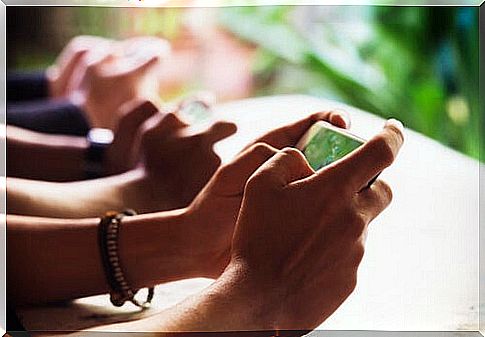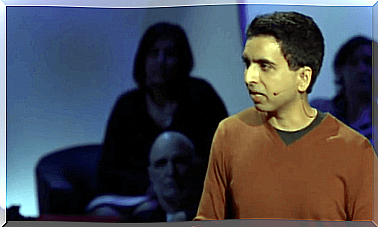Experiential Avoidance Disorder And The Mobile Phone

Experiential avoidance disorder is one of the central concepts of third generation therapies, particularly acceptance and commitment therapy. It is quite common for it to appear in our current society, taking into account that we live in the culture of well-being and immediacy.
The reader will wonder why heading towards this hedonism is not advisable, when the moment gains value in the face of a finite and indeterminate life experience.
That is precisely where the problem lies, in the ideas that culture and society try to engrave in our minds. We are taught to be happy most of the time, avoiding any discomfort, even a small one.
The central idea is: ” Deny your negative emotions, do not tolerate discomfort, always be happy .” In this way, we create technologies that help us have a more comfortable life, thinking that this will be the solution to our problems, such as the mobile phone.
Do we remember when our grandmothers had to go wash their clothes in a sink and put them to dry in the sun? Today that is over, we have a washer and dryer. Can we recall those times when to talk to someone on the phone you had to wait until you were home and the other person was also at home to help you? That no longer happens, we have the mobile phone and WhatsApp .
This inevitably has made us less tolerant and less flexible. We have gotten used to having it all now and bear with difficulty that it is not this way.

How does the mobile phone feed experiential avoidance?
The mobile phone is a very useful device, favorable to our interests if we use it wisely. In it we usually have data and information stored about important parts of our life, such as work, personal life or studies. By losing the mobile phone, we would lose many useful resources: contacts, notes, messages, etc.
The mobile phone problem is an instrument that accompanies us in experiential avoidance. The comfort that it provides in every way is so wide that we end up becoming intolerant of uncertainty, non-immediacy or non-information.
In this way, it sometimes happens that we get extremely angry because our partner has not answered us on WhatsApp immediately. Or, if we want to know something about someone who is in our network, we can do it right now, without the need to make an appointment.
The mobile phone makes us impatient and patience is an extremely valuable quality. Although we have such a device, we do not stop moving and living with an uncertain life, in which many rewards or reinforcements are only given over time. The mobile gives us this false sense of control that makes the human being vibrate so much.
One of the consequences of this is that we end up being addicted. The mobile phone ends up becoming the tool that covers the grooves of discomfort that we detest. This leads to the non-experience of the real world, with its pluses and minuses and, consequently, living a little less.

What can we do to avoid experiencing experiential avoidance as a result of the mobile?
If we feel that our dependence on the mobile phone increases to stimulate us, alleviate uncertainty, know results that are constantly updated, etc., it is likely that we are hooked on that immediate well-being that this technology offers us.
The “surveillance work” we do with the telephone only reinforces our intolerance and impatience. Sometimes it is an obstacle to learning to manage emotions that can be uncomfortable.
Therefore, the first strategy is to carry out a stimulate control. A good idea is to set times dedicated to the telephone consultation; time to browse social networks, answer emails or make calls. If the urge to catch it appears earlier, the ideal is to try to delay that compulsion for five more minutes to distance yourself from that desire or craving.
Another strategy is to disconnect from some unnecessary applications or reduce them to just one time of the day or week. The idea is to detoxify from them for a time, so that we can see to ourselves that we are capable of living life without them.
Finally, it is advisable to leave the mobile at home when we go out to make some plans and in principle, we do not expect any important calls. For example, if we go to the supermarket to buy – in this way, when we are in the queue to pay instead of taking out the mobile, we will tolerate the experience of doing nothing.
Do you find very complicated recommendations? If they seem almost an abyss to you, you are surely immersed in experiential avoidance as a result of the mobile. Therefore, this article is for you. Do you dare to develop ways and means of enjoying beyond a technology?









